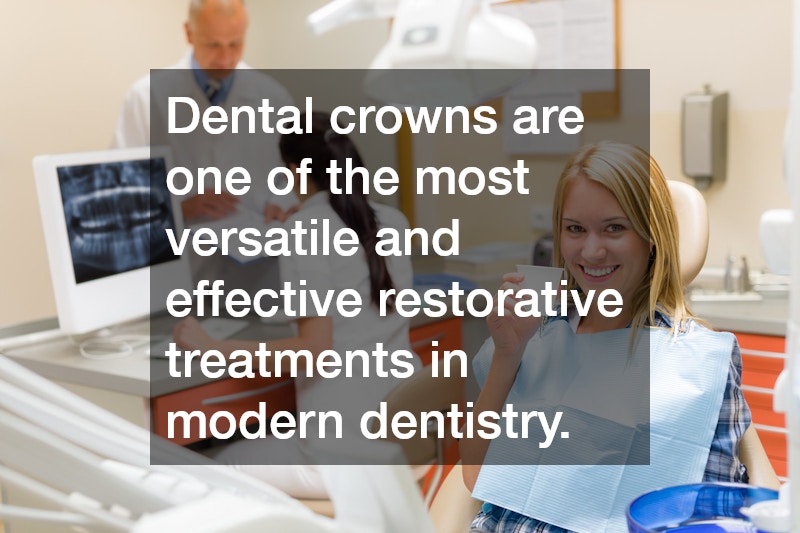What Are Dental Crowns and When Do You Need One?
Dental crowns are one of the most versatile and effective restorative treatments in modern dentistry. They restore strength, shape, and appearance to damaged or weakened teeth, often providing long-lasting protection where other restorations may not suffice. The following article explores what dental crowns are, when they are recommended, the types available, and how to care for them, helping you make informed decisions about your oral health.
What is a Dental Crown?
Definition and Purpose
A dental crown is a custom-made cap placed over a damaged, decayed, or weakened tooth. It restores the tooth’s original size, shape, and function while protecting it from further damage. Crowns are also used to anchor bridges, cover dental implants, and enhance the appearance of discolored or misshapen teeth.
Materials Used in Dental Crowns
Crowns can be crafted from several materials, each suited to different needs:
-
Porcelain: Natural-looking and stain-resistant, ideal for front teeth.
-
Metal: Extremely durable and long-lasting, commonly made from gold or base metal alloys.
-
Porcelain-fused-to-metal (PFM): Combines strength and aesthetics, often used for both front and back teeth.
-
Zirconia or composite resin: Modern, metal-free options that balance durability with natural appearance.
Benefits of Dental Crowns
Crowns restore full function for chewing and speaking, prevent further decay or cracking, and protect teeth after root canal therapy. They also improve appearance, offering a seamless blend with surrounding teeth.
Potential Drawbacks and Considerations
Crowns require slight reshaping of the natural tooth, and some patients may experience temporary sensitivity after placement. Costs vary based on material and location, and periodic maintenance is needed to ensure longevity.
How Dental Crowns Compare to Other Restorations
Unlike fillings, which repair small areas of decay, crowns cover the entire tooth for full protection. Compared to veneers, crowns offer more strength and are better suited for structural repair rather than cosmetic enhancement alone.
When Should You Consider Getting a Dental Crown?
Common Symptoms Indicating a Need for a Crown
You may need a crown if you have a cracked, worn, or severely decayed tooth, sensitivity when chewing, or a large filling that weakens the remaining structure. Crowns are also common after root canal procedures.
Conditions Treated with Dental Crowns
Crowns are used to restore teeth following injury or decay, protect weak teeth from fracture, and replace missing teeth as part of an implant restoration. They can also correct alignment or shape issues for both functional and cosmetic reasons.
Timing Between Diagnosis and Treatment
After diagnosis, most patients receive a temporary crown within one to two visits while the permanent one is fabricated. Early treatment prevents further damage and discomfort.
Consultation Process with Your Dentist
Your dentist will perform an exam and X-rays to assess damage and determine the best crown material for your needs. They’ll explain the process, costs, and aftercare expectations before beginning treatment.
Cost Considerations and Insurance Coverage
The cost of a dental crown typically ranges from $800 to $1,800 per tooth, depending on material and complexity. Most dental insurance plans cover part of the cost when crowns are deemed medically necessary.
Types of Dental Crowns
Overview of Different Types
Each crown type has unique benefits in strength, appearance, and cost. Choosing the right one depends on tooth location, cosmetic goals, and budget.
Porcelain Crowns
Highly aesthetic and ideal for front teeth, porcelain crowns mimic natural enamel color and translucency but may be less durable under heavy biting pressure.
Metal Crowns
Metal crowns, including gold and metal alloys, are extremely strong and resistant to wear. They are best for molars where appearance is less of a concern.
Porcelain-fused-to-Metal (PFM) Crowns
PFM crowns balance durability with natural color but may show a faint dark line near the gumline over time. They are a reliable option for both front and back teeth.
Zirconia and Composite Crowns
Zirconia crowns are strong, biocompatible, and highly aesthetic. Composite resin crowns are affordable and natural-looking but typically have a shorter lifespan.
What to Expect During the Dental Crown Procedure
Initial Consultation and Assessment
The process begins with an examination and X-rays. Your dentist evaluates the tooth structure, discusses material options, and outlines the treatment plan.
Preparation and Impression Taking
The tooth is reshaped to make space for the crown, and an impression or 3D digital scan is taken. This mold ensures a precise fit and comfortable bite.
Temporary Crown Placement
A temporary crown is placed to protect the tooth while the permanent one is being made in a dental lab, which usually takes one to two weeks.
Final Crown Placement
Once ready, the permanent crown is checked for fit and color, then cemented securely. Your bite is adjusted to ensure comfort and proper alignment.
Aftercare and Follow-up Visits
Mild sensitivity or soreness may occur for a few days after placement. Your dentist will schedule a follow-up visit to ensure proper function and comfort.
How to Care for Your Dental Crown?
Daily Oral Hygiene Tips
Brush twice daily with fluoride toothpaste and floss gently around the crown. Maintaining good oral hygiene prevents decay along the crown’s edges.
Foods and Habits to Avoid
Avoid chewing hard objects like ice or pens, and limit sticky foods that could loosen the crown. Wearing a night guard helps protect against grinding damage.
Managing Discomfort after Crown Placement
Mild soreness or temperature sensitivity usually resolves within days. Over-the-counter pain relief can help manage any discomfort.
Recognizing Signs of Crown Complications
Contact your dentist if you notice looseness, cracks, or persistent sensitivity. Early intervention prevents further issues.
Regular Dental Check-ups and Maintenance
Routine dental visits allow your dentist to check the crown’s integrity and polish it to maintain a natural shine. With proper care, crowns can last 10 to 15 years or longer.
Dental crowns play a vital role in restoring function, strength, and beauty to damaged teeth. Understanding their materials, applications, and care needs helps patients make informed choices about their oral health. If you have a weakened or damaged tooth, consult your dentist to determine whether a dental crown is the right solution for protecting your smile and ensuring lasting comfort.











